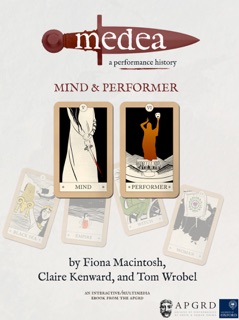In 2016 the University of Oxford’s Archive of Performances of Greek and Roman Drama (the APGRD) published Medea, a performance history - a free interactive/multimedia ebook on the production history of Euripides’ Medea, the ancient Greek tragedy about a mother who, betrayed by her husband, exacts revenge by killing her children. First performed nearly 2,500 years ago, and continually reinvented since, Medea remains the most controversial yet alluring female role in the history of theatre worldwide.
Now, Medea, a performance history: Mind & Performer offers two related chapters from the ebook in order to provide a quicker-to-download, bitesize instalment. The first chapter, Mind, asks whether Medea’s murder of her own children is an act of insanity, frenzy, or calculated brutality? What does it cost an actor to perform such a role? and how have different productions tried to stage the controversial and contested issue of Medea’s mental state? The second chapter, Performer, explores the ways in which Euripides’ Medea, like Shakespeare’s Hamlet, is a consummate performer within her own play, inhabiting numerous disparate roles through the course of the tragedy. Like Hamlet, the role is a star-vehicle for actors, and our ebook concludes with a chronological image gallery offering a “visual roll-call” of actors who have come to define the role of Medea.
The APGRD’s interactive/multimedia ebooks draw on a unique collection of archival material and research at the APGRD and beyond, and use images, film, unique interviews and digital objects to tell the story of a play that has inspired countless interpretations onstage and onscreen, in dance, drama, and opera, across the globe from antiquity to the present day.
















